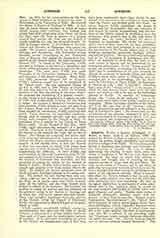

Aimerich, MATEO, a learned philologist, b. at Bordil, in Spain, 1715; d. at Ferrara, 1799. He entered the Society of Jesus at eighteen, and, having finished his studies, taught philosophy and theology in several colleges of his Order. He was subsequently Rector of Barcelona and Cervera, and Chancellor of the University of Gandia. He was at Madrid, supervising the printing of some books, when the decree of expulsion of the Society from Spain was announced. He went on board ship without a murmur, and thought only of consoling his companions, several of whom were old and infirm. He took up his abode at Ferrara, and it was there, in exile, that he composed the works which have won for him a distinguished place among the philologists and critics of the eighteenth century. What is remarkable about his literary labors is that his only help was the public library, and even that his infirmities often prevented him from consulting. He died, at the age of eighty-four, in sentiments of great piety. Gifted with a fine, judicious mind, he united to his vast erudition the faculty of writing Latin with great elegance and purity. Besides some works of scholastic philosophy, ascetical works, and discourses, we have from his pen, 1st, “Nomina et acta Episcoporum Barcinonensium”; 2d, “Quinti Moderati Censorini de vita et morte linguae latinae Paradoxa philologica, criticis nonnullis dissertationibus opposita, asserta et probata”, of which there were but a few copies printed; the book is consequently very rare; 3d, a defense of the preceding work; 4th, “Specimen veteris romanae literaturae deperditae vel adhuc latentis;” 5th, “Novum Lexicon historicum et criticum antiquae romanae literaturae.” This work, which is the sequel to the preceding, was the one which made Aimerich’s reputation. He left also a MS., which was a supplement to his dictionary; and a number of Latin discourses.
T. J. CAMPBELL

